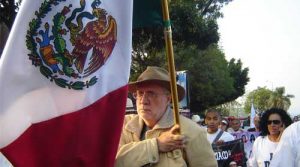Mexican Scribe Javier Sicilia Brings Campaign for Peace to U.S.

New America Media

LOS ANGELES — Javier Sicilia looks tired. The 56 year-old Mexican poet, essayist, journalist and novelist has been going non-stop since March 28th of last year, which is the day he acquired a distinction that is every Mexican’s nightmare: to be a member of one of the roughly 60,000 families to have lost one or more loved ones to the accelerated violence that has gripped Mexico since President Felipe Calderon began his crusade against the drug cartels six years ago.
In the spring of 2011, Sicilia’s son Francisco, 24, along with several of his friends, was killed after leaving a bar where witnesses said they had been talking loudly about the cartel-fueled violence in their country. Their dead bodies were discovered later that night in a car, accompanied by a note that read, “This is what happens to those who make anonymous calls to soldiers.” The killings, which occurred in the town of Cuernavaca, were highly publicized on both sides of the border.
Since then, Sicilia has been roaming Mexico’s northern and southern states demanding peace, justice and dignity for the families of victims of organized crime. And however tired and disillusioned by the actions of the Mexican government he may be, Sicilia doesn’t plan to give up his quest anytime soon. To the contrary, after catching a red eye flight last week from Mexico City to Los Angeles to meet other family members of victims, he quickly lined up a series of meetings with community leaders and labor representatives to work out the logistics for the next phase of his campaign. Believing deeply that U.S. government officials share as much responsibility as their counterparts in Mexico, Sicilia plans to make his plea to the U.S. Congress this summer.
Between now and then, Sicilia will be spending his time organizing a caravan due to depart from the border town of San Diego in August, making stops in over twenty U.S. cities and finishing at the steps of the U.S. Capitol where he plans to repeat the message he’s been spreading all over his native country: “!Estamos hasta la madre!” Roughly translated to English, the phrase means, “We’ve had it!”
In Sicilia’s view, as long as both countries aren’t making it a priority to stem the flow of weapons south from the U.S. to Mexico, instead keeping to their same policies of penalizing drugs and imposing fines for money laundering, the only winners will be the already bloated prison industry, and the Mexican Army. The latter, says Sicilia, has been the main beneficiary of the roughly $1.7 billion dollars in economic and logistical aid granted by the U.S. to Mexico and several countries in Central America under the Merida Initiative, a massive security agreement to combat drug trafficking, organized crime and money laundering. The initiative was authorized by Congress in 2008.
“The jails in Mexico and in [the U.S.] are filled with young people accused of the crime of drug consumption, while the real criminals walk freely, work for the government, or hold well paying jobs in white collar positions. The only thing we are achieving with these policies is to destroy a whole generation of young people in both countries,’’ Sicilia concludes.
With Mexico’s presidential elections quickly approaching, Sicilia’s message could very well resonate on the U.S. side of the border, where a huge pool of Mexican nationals – an estimated 4 million — are eligible to vote in their country’s national election. If history is a guide, just a fraction of those will actually register to vote and participate in the election – only 33,000 did so in 2008. Nevertheless, the issue of violence is paramount in the minds of many Mexican voters, and the drug war policies implemented by current president Felipe Calderon and his ruling National Action Party (PAN) have increasingly been blamed for the years-long spike in gruesome cartel-related killings and disappearances.
“How could it be possible that during the past six years we have had more than 60,000 deaths, 10,000 disappearances and 160,000 displaced people, yet only two percent of those crimes have been resolved?” asked Sicilia to a group of Latino journalists who met him after his arrival to “La Iglesia de la Placita,” one of the oldest Catholic churches in downtown Los Angeles. “It is clear that Mexicans have been living under a failed state. It’s a national tragedy born of a wrong strategy.”
Which is why, explains Sicilia, he is organizing the caravan bound for Washington D.C., something that no Mexican national, he points out, has ever attempted.
When asked if he expects actual results to come as a result of the campaign, Sicilia shrugs his shoulders and answers in a deep, calm voice.
“I am convinced that change will come from the bottom up of society, not from the top. If we the citizens don’t voice our concerns and pressure the politicians, nothing is going to happen.”






